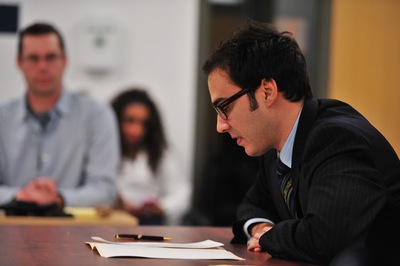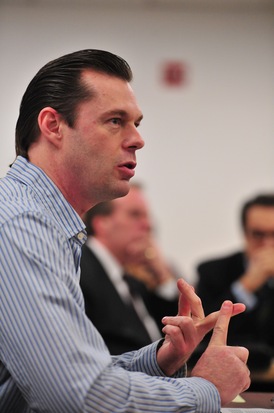Update at 1:19 p.m.: The story now includes comments from Senior Assistant City Attorney Kristen Larcom, who said the city still stands behind the tickets written for limos "impersonating" taxis.
Ann Arbor's Taxicab Board heard a litany of complaints from local cab and limo drivers Thursday night in response to a recent city police crackdown on limousines "impersonating" taxis.
Meanwhile, a representative of the Great Lakes Limousine Association, who was invited by Board Chairman Stephen Kunselman to speak at the meeting, dropped what one observer characterized as a nuclear bomb by accusing the city of illegally ticketing state-licensed limo drivers.
Nicholas Kokas, GLLA's president, said his association — much like the city — frowns upon limos that act like city-licensed taxis and go trolling for fares without having pre-arranged rides. Still, he said, the city of Ann Arbor doesn't have any legal authority under state law to write tickets for that.
"The only way a city could possibly add their own restrictions against a limousine is if they had a population in excess of 750,000," he said.
Clik here to view.

Nicholas Kokas, the Great Lakes Limousine Association's president, said his association — much like the city — frowns upon limos that act like city-licensed taxis and go trolling for fares without having pre-arranged rides. Still, he said, the city of Ann Arbor doesn't have any legal authority under state law write tickets for that.
Ryan J. Stanton | AnnArbor.com
"Every community that has (restrictions) on their books, they have been unenforceable because the state law is pretty strong in terms of protecting the limousine company," he said.
While some question whether the city is allowed under state law to regulate state-licensed limousines locally, Senior Assistant City Attorney Kristen Larcom, who attended Thursday's meeting, said the city still stands behind the tickets written for limos "impersonating" taxis.
"The city does not have local regulations for limousines," she said. "It only regulates taxicabs, and any vehicle being operated in the manner that taxicabs operate must be licensed under the city's taxicab ordinance. The city's ordinance also prohibits taxicabs from being held out as limousines."
Ann Arbor Police Officer Jamie Adkins gave a report on recent police enforcement efforts at Thursday's meeting. She said midnight officers started issuing warnings to limo drivers around Feb. 15 and handing out information cards explaining the city's taxicab ordinance.
This past weekend, she said, police began issuing citations under a section of the city ordinance that states no one without a taxicab license from the city can operate as a taxi and solicit or accept passengers who have not previously arranged to be transported.
"Officers issued five citations to limousine drivers operating as taxis, and then there were some additional violations," Adkins said, noting that as a secondary offense police are ticketing those same drivers if they have lights on the roofs of their vehicles advertising they're for hire.
Ken Pickett, a limo driver for Yellow Car who also holds a cab license, questioned the direction the city has gone with recent enforcement.
"It seems like a gross misuse of the police's time to spend their night looking for us when there are so many drunk people and assaults that we see going on," he said.
Between the hours of 10 p.m. and 3 a.m., Pickett said, there's an abundance of individuals on the street and they need reliable transportation to get home.
"The city mandating people take top lights off their cars," he said, "is almost more outrageous than going to Pizza House and telling them, 'No, you can't advertise Pizza House on the top of your car.' "
Members of the Taxicab Board said they were pleased to see police enforcing the city's taxicab ordinance, but Kokas and others still argued the city's actions conflict with state law. The enforcement was prompted by a series of alleged sexual assaults on women by cab drivers in Ann Arbor.
One of the limo drivers ticketed by the city for "impersonating" a taxi is Mark Neumann, owner and operator of Stadium Taxi, an Ypsilanti-based company with two taxis and two limos.
Clik here to view.

Mark Neumann, owner and operator of Stadium Taxi, appears before Ann Arbor's Taxicab Board on Thursday. He got a ticket in Ann Arbor last week for 'impersonating' a taxi and he's now fighting the ticket.
Ryan J. Stanton | AnnArbor.com
On the night he was ticketed, Neumann said, he had just picked up some passengers outside Rick's American Cafe on Church Street. He said the passengers called him earlier in the night for a ride to the bar and they also arranged for a ride home around 1 or 2 o'clock in the morning.
"Actually mine was pre-arranged. They called me," he said. "I showed the cop that and everything, and he still wouldn't have it. He gave me the ticket."
Before leaving city hall Thursday night, Neumann was provided some assurances by city officials that his ticket might be tossed out, but that's not official until it's done through the courts.
"Certainly we're thoughtful about the actions that we're taking, and if there is something where we made a mistake, we absolutely want to fix it," said Tom Crawford, who doubles as the city's chief financial officer and taxicab administrator.
On the broader legality of the city's tickets in respect to the state's limousine act, Crawford said whether Neumann gets his ticket thrown out "doesn't have anything to do with the fact that we're proceeding as we feel is appropriate. They're really not related."
As the Taxicab Board searches for solutions, at least two board members — Kunselman and Michael Benson — expressed interest in considering an idea suggested at Thursday's meeting by Rick Clark, owner of Amazing Blue Taxi, a city-licensed taxicab company.
Clark said there's a simple solution to what he called a "relatively minor problem" involving taxis and limos in Ann Arbor, and that's the deregulation of taxicab fares. He said the taxicab business is the only industry in Ann Arbor where the city sets the price.
The city's strict regulations regarding taxicab fare rates and seeming inflexibility in allowing licensed taxicabs to compensate for rising gas prices by raising fare rates is one reason cited why some companies, including Yellow Car, are choosing to operate as limos instead of taxis. Another reason cited by some drivers is that it's a lot cheaper to insure a limo than a taxi.
Clik here to view.

Michael Benson, a member of Ann Arbor's Taxicab Board, said he hopes the board can have a thoughtful discussion about taxicab fare rates set by the city, as well as gas prices and the cost of operating a taxi. No action was taken Thursday night.
Ryan J. Stanton | AnnArbor.com
Benson said he hopes the Taxicab Board can have a thoughtful discussion about fare rates, as well as gas prices and the cost of operating a taxi. No action was taken Thursday night.
The City Council voted in May 2011 to set a new maximum allowable rate of $2.50 per mile in the city limits — up 25 cents. The flag drop fee — the flat amount charged in addition to the mileage rate — remains $3, and the waiting time fee remains at $24 per hour.
Kunselman said deregulating taxicab fares was the most constructive comment he heard from any of the drivers who lined up to speak Thursday night. He sees it as a potential way to bring some limo companies "back into the fold" and operate as licensed taxis again.
"Safety is paramount," Kunselman said. "As we've heard, there is a difference between a limousine and a taxi, and it's our responsibility as a taxicab board to ensure the safety of our citizens. And we regulate taxis. We don't regulate limos. I have no interest in dual-licensing."
Kokas said having dual-licensing — an idea suggested by some to allow limo drivers to also obtain taxicab licenses from the city — could create conflicts between the city's ordinance and state law.
He said his association wants to see limos operate as limos and taxis operate as taxis, as there are clear distinctions between the two models.
"Since its inception nearly 20 years ago, the Great Lakes Limousine Association has had the same stance: A taxicab is not a limousine, and a limousine is not a taxicab," he said.
"Separate taxi laws are required because, when a person is standing on the side of the street, hailing a taxi, that person usually has no idea whom they are getting into the car with," he said.
Gordon Berry, a limo driver for Yellow Car, told the board Thursday he was having trouble following the logic of the city's crackdown on limousines in the aftermath of three alleged sexual assaults on women by cab drivers. In two of those instances, he said, the details remain hazy, and in the third case, it was a city-licensed taxicab driver who has been charged.
"Solve the problems, but don't take it out on us," he said. "You're just beating up a bunch of hard-working men and women who work long hours for not very much money."
Tim Tobias, president of Michigan Green Cabs, another limo company Kunselman has accused of flouting the city's taxicab ordinance, told the board the bottom line should be safety.
Clik here to view.

Mark LaSarge, a former taxicab driver and now state-registered limousine chauffeur, appeared before Ann Arbor's Taxicab Board on Thursday and questioned whether the vehicle-for-hire industry in Ann Arbor should be defined by the method a passenger uses to order a vehicle.
Ryan J. Stanton | AnnArbor.com
Tobias said each of his cabs can be monitored 24-7 by a satellite surveillance system — something he recommends all vehicles for hire adopt.
"We have a GPS in all of our vehicles, so we can look back at any moment," he said. "If you called us, we could tell you exactly where our cars are, how fast they were going, where they've been."
Paul Epstein, another Yellow Car driver, said there usually is no shortage of vehicles for hire in Ann Arbor, but there are times when demand spikes.
It's those times, like when the bars close, Epstein said, that it's essential and in the interest of public safety that companies like Yellow Car be allowed to pick up people trying to hail a ride.
"At 2 o'clock in the morning on a Thursday, Friday, Saturday night, I typically can be flagged down by two dozen people at the same time at the same intersection. And very few of them, sadly, are going to get vehicles," he said. "It's just not a very good scene."
Neumann said the city's ramped-up enforcement is chasing many drivers out of town, leading to more fights outside of bars where people congregate while waiting for a ride.
"I'm just saying, it's going to be a big safety hazard down the road if you guys don't stop nailing us for these limos," he said.
He speculated what might happen if the city doesn't allow limos to pick up people during football season later this fall, especially after any night games. He recalled the Notre Dame night game two seasons ago when people were still out trying to catch rides at 6 a.m. the next day.
"You guys are going to have to give some kind of leeway," he said.
Kokas said his association still feels strongly that a state law requiring limousines to officially operate in a pre-arranged manner, which he believes most already do, is needed. The GLLA helped introduce legislation to achieve that in the last legislative session but it didn't make it through the Legislature.
"This language would help differentiate limousine operators from taxi operators and allow the taxi industry to exclusively be able to accept hailed passengers off the street," he said.
"While the GLLA is considering its options for the new legislative year, we hope the city of Ann Arbor can work with the association and support its endeavors to clear the gray areas in the law," he added, suggesting the city also should work with local taxicab companies on local regulations.
"This time in Ann Arbor history could serve as a great opportunity for city officials and taxicab company owners to work together to produce a system that benefits the traveling public with strengthened safety standards," he said, "while making less restrictive requirements to taxi companies so that it makes good financial business sense to become licensed as an Ann Arbor taxicab."
Watch Rick Clark makes his case for deregulating taxicab fare rates in Ann Arbor:
Ryan J. Stanton covers government and politics for AnnArbor.com. Reach him at ryanstanton@annarbor.com or 734-623-2529. You also can follow him on Twitter or subscribe to AnnArbor.com's email newsletters.